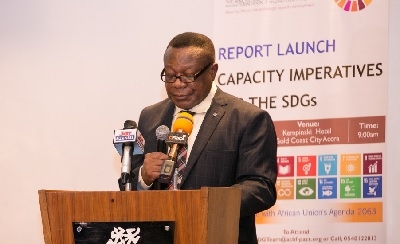
Accra, 26 Nov 2019 - The African Capacity Building Foundation (ACBF), the African Union’s (AU) specialized agency for capacity building, in partnership with the SDGs Advisory Unit in the Office of the President have launched a Report titled; Capacity Imperatives for the Sustainable Development Goals: In line with African Union’s Agenda 2063 from multi-sector groups representing the public sector, non–governmental organizations (NGOs), civil society organizations (CSOs), international institutions, Diplomatic corps, academia and the media.
The ACBF in line with its mandate, to build human and institutional capacity in Africa published the seminal report which identifies the capacities that African countries need in order to take advantage of the opportunities presented by the SDGs to build economies that can sustain their development aspirations. It identifies areas for strengthening capacity and capacity enabling approaches for a range of stakeholders, including international partners.
The report offers policymakers a new approach to development which puts Africans in the driver’s seat. And it shows how countries can improve people’s lives in ways that are consistent with ACBF’s vision of an Africa capable of achieving its own development.
The report also finds that capacity remains the critical missing link for fulfilling the development agendas of most African countries.
Prof. George Yaw Gyan-Baffour, Minister for Planning in Ghana presided over the event and launched the report on behalf of H.E Nana Addo Dankwa Akufo-Addo, President of the Republic of Ghana.
In his Keynote Address, Prof. Gyan-Baffour, acknowledged the work of ACBF in building human and institutional capacity in Africa and thanked the Foundation for choosing Ghana as the venue to launch the report. The choice of Ghana was in recognition of President Nana Addo Dankwa Akufo-Addo’s role as co-Chair of the Secretary General’s Eminent Group of Advocates of the SDGs and his leadership in implementing this agenda across the continent.
Prof. Emmanuel Nnadozie, Executive Secretary of the ACBF in his Introductory Remarks, outlined the challenges facing Africa.
‘The achievement of the SDGs are being hobbled by severe capacity deficits often in the form of shortage of critical skills, deficits in leadership, inhibiting mindsets and weak institutions. This has severely hampered the ability to implement existing policies and development strategies across the continent,’ said the Executive Secretary.
He went on to say, ‘Identifying and addressing capacity deficits, especially implementation capacity deficits will require considerable effort in developing leadership and critical skills, catalyzing mindset change and building or strengthening key institutions at country, regional and continental levels and among the state and non-state actors.’
However, he went on to give the good news that ACBF and others have achieved tangible results and made significant impact over the past 3 decades in addressing the capacity challenges facing the continent.
Prof. Nnadozie gave a brief summary of the ACBF’s achievements in 2019 which included;
- Empowering women in Agriculture and Promoting Women’s Entreprenurship programs. ACBF implemented a skills building program for selected women entrepreneurs in Chad, Mali, Republic of Congo, Liberia, Malawi and Rwanda. Skills were especially developed in such areas as planning and organizing, marketing and financial management.
- Supporting the monitoring of the implementation of Agenda 2063; tackling implementation challenges in Africa and fostering transformative leadership in Africa and enhancing COMESA’s organizational performance.
- Establishment of the first ever think tank in the Union of the Comoros; developing and launching of The Gambia’s Capacity Development Strategy; enhancing farmers’ productivity and access to markets in Ethiopia; enhancing absorptive capacity and M&E in Zimbabwe; promoting domestic resource mobilization in Malawi and providing on-demand advisory services to member States.
- Supporting and enhancing organizational monitoring and evaluation systems for civils society organizations involved in tobacco control, which has led to the passage of tobacco control legislations in Côte d’Ivoire, Ethiopia and Kenya.
- Enhancing the contributions of knowledge networks and communities of practice, including the African Think Tank Network and the Africa Communities of Practice (AfCoP) on Management for Development Results; documenting and sharing lessons learned in capacity development and increasing access to and use of knowledge on capacity development.
The Report can be downloaded from the ACBF e-library. Click HERE to download.
---
For more information, contact:
Tsitsi Spargo-Chakonza
The African Capacity Building Foundation
Harare, Zimbabwe
+263 242 304663, 304622, 332002, 332014; Ext. 279
Email: [email protected]
About the African Capacity Building Foundation
Established in 1991, ACBF builds human and institutional capacity for good governance and economic development in Africa. To date the Foundation has empowered people in governments, parliaments, civil society, private sector and higher education institutions in more than 45 countries and 6 regional economic communities. ACBF supports capacity development across Africa through mobilization and leveraging of resources for capacity development; grants, investments and fund management; knowledge services; promoting innovation in capacity development and capacity development advisory services. The establishment of ACBF was in response to the severity of Africa’s capacity needs, and the challenges of investing in indigenous human capital and institutions in Africa. ACBF interventions are premised on four principles: the centrality of capacity to the development process in Africa; the critical role of a partnership and demand-driven approach in tackling capacity challenges; African ownership and leadership in the capacity development process; and a systematic, sequenced and coordinated approach to the capacity development process that pays attention to capacity retention and utilization. For further information go to: www.acbf-pact.org





